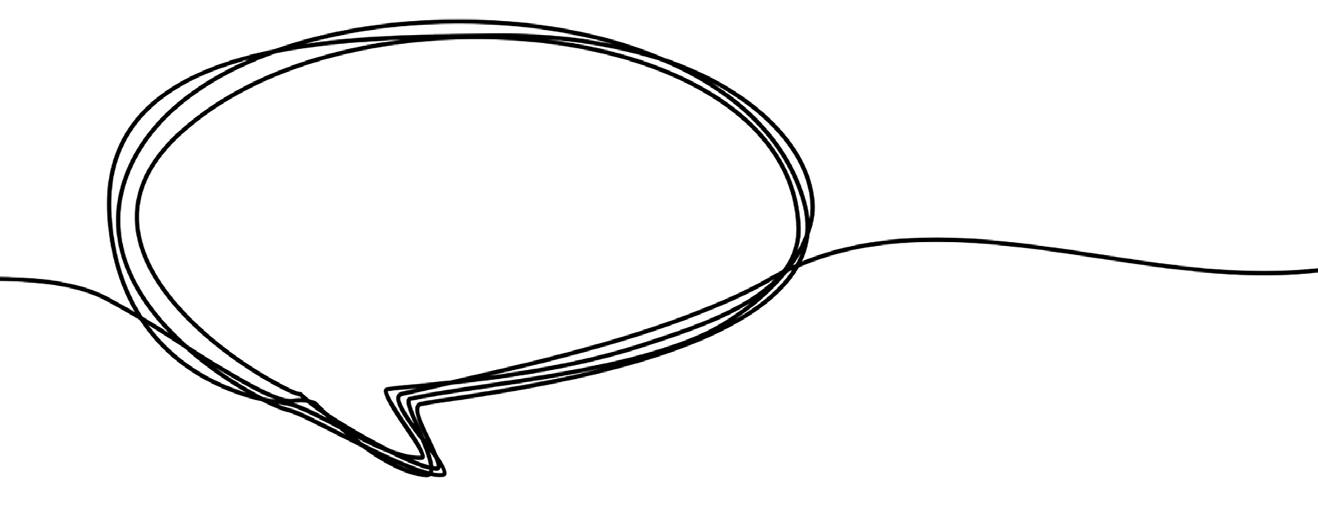
4 minute read
Vital Conversations
SIX years ago, the police-involved deaths of Michael Brown in Ferguson, MO and Eric Garner in New York City put assessment is crucial because today’s St. John’s Law students will be the leaders of reform tomorrow.” relationships between community members become deeper the more time they spend engaging in that way.” issues of anti-Black racism and state-sanctioned violence Dialogue Day’s successful launch inspired Winfield and Ashlyn Stone ’23 experienced that deep community in the national spotlight. Looking to process their outrage other students to start the Coalition for Social Justice connection as a 1L participating in her first Dialogue Day in and grief, a group of St. John’s Law students approached which, together with the Ron Brown Center, has taken the the fall, when the Law School community gathered online Dean Michael A. Simons and Professors Elaine M. Chiu lead in producing Dialogue Days annually across a range to talk about election law and voter suppression. The topic, and Rosa Castello ‘06 with an idea. of timely topics, including: she says, had personal resonance. “I grew up in the South and always felt like my political beliefs were well within the “They wanted to talk about it, and they wanted the Law • Immigration policy and reform minority. I had heard about voter suppression, but Dialogue School to talk about it,” says Professor Castello, who • Gender in America Day opened my eyes to its full scope and impact.” directs the Ronald H. Brown Center for Civil Rights with • Free speech and its boundaries Professor Chiu. “We got involved because of our roles with • #MeToo Movement It didn’t take Stone long to act on that new awareness. the Ron Brown Center, but it was more than just that. We • Climate change “A friend called me on Election Day when she was denied wanted to help the students make this happen, to give • Inclusivity and diversity a provisional ballot in North Carolina, where she attends them a space to talk and think about change. I wanted • Sex trafficking and sex work college,” she explains. “They asked her for documents to talk, too, but I also wanted to listen to what the that no one is required to provide in order to vote. I knew students had to say, to hear how they were hurting, and This past June, in the wake of the senseless killing of from attending Dialogue Day that the only recourse was to understand their concerns.” George Floyd, St. John’s Law students, faculty, and staff to report the issue to the North Carolina State Board of came together again, this time for a virtual Dialogue Day Elections. So, I did. I was happy to play a small role in With this support, the first Dialogue Day was held at program about law, justice, and racism. Pharoah Sutton- combating voter suppression and overjoyed that St. John’s St. John’s Law in January 2015. After gathering in the Jackson ’21 was one of the lead facilitators of the event, gave me such practical experience to lean into.” Belson Moot Court Room for introductory remarks—which which called participants to action with the prompt: No included the recitation of ground rules designed to create a More Talking, What Are We Going to Do? That action Reflecting on past Dialogue Days and looking forward to safe space and judgment-free zone—students, faculty, and included commitments from the Law School and many future ones, Professor Chiu says: “The greatest reward staff broke into small groups for facilitated conversations. of its student groups to becoming actively and ardently for me has been to witness the strength and the values After the breakout sessions, everyone returned to the antiracist in form and function. of our students, to learn from their experiences and their Mattone Family Atrium for fellowship and refreshments. voices, and to build a bond of respect and trust with Considering his own Dialogue Day experiences through them and among them. And I think the greatest reward “It’s hard to talk about something you find the years, Sutton-Jackson sees how its unique format sets for St. John’s Law has been its strong commitment to uncomfortable, or that makes you feel attacked because the event apart. “Dialogue Days aren’t like classrooms honest, genuine, inclusive, and respectful dialogue, and to you identify with a certain group,” says Leah Winfield or offices, where certain power dynamics control the that dialogue’s power to transform, to inspire, to teach, ’17, who helped to organize that first Dialogue Day. interaction,” he notes. “Ideally, professors don’t feel the and to bring about positive change. While Dialogue Days “We wanted this community-wide conversation to need to teach and can allow themselves to learn. Ideally, don’t lead to instant solutions, participants learn to listen be about perspective shifting. But it’s not just about administrators can participate and not feel the need to genuinely and to consider seriously other points of view. holding others accountable. It’s also about looking orchestrate. Ideally, students can express themselves Many come away with new thoughts and broadened inwards and examining ourselves. Honest self- without feeling the need to perform or impress. The mindsets, and that’s our goal here.”









